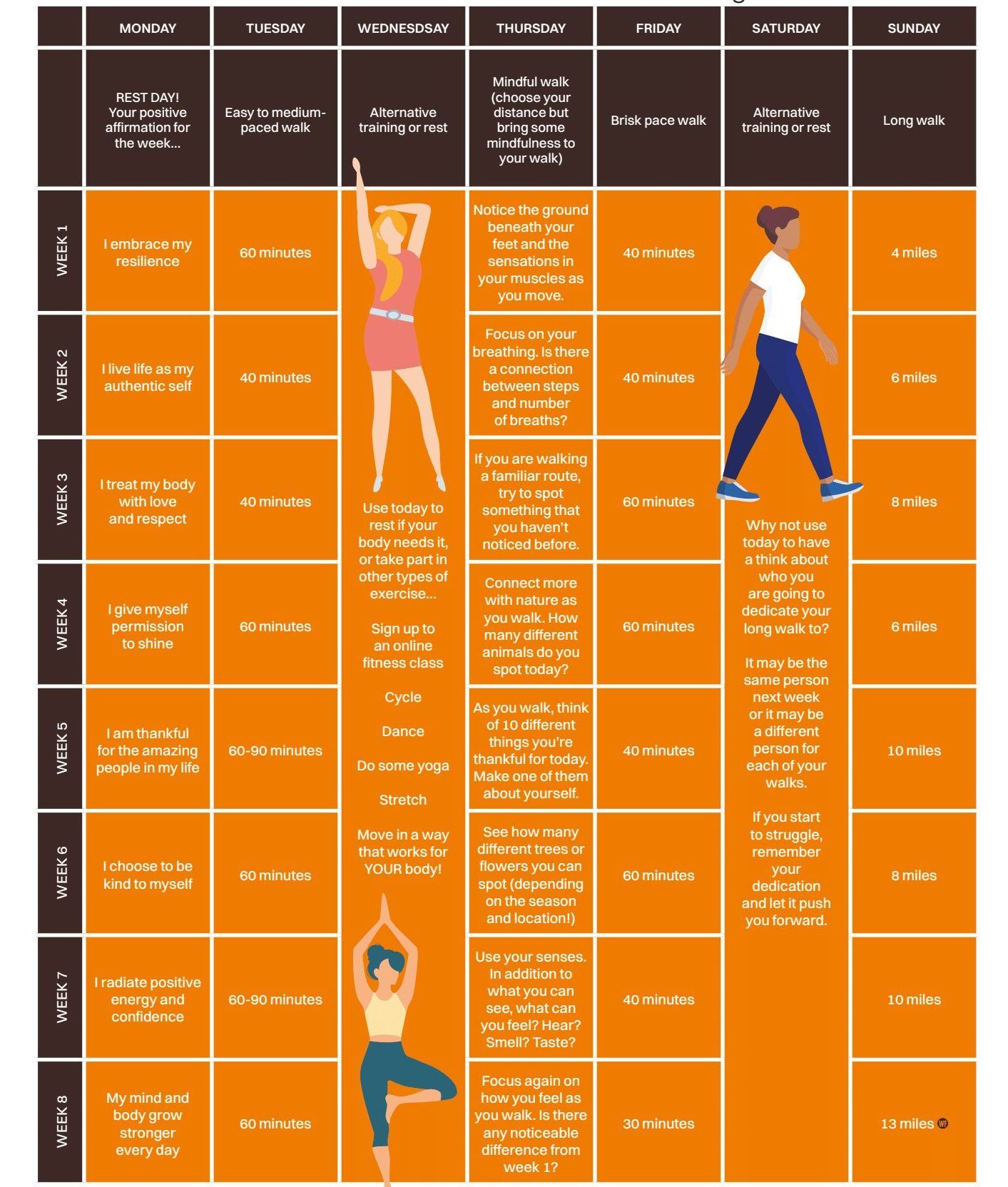Discover the mental and physical health benefits of walking, according to experts. Plus, try our 13-mile walk training plan to build your endurance…
Do you struggle to head out for a run or fitness class, but love a walk? Or maybe you keep getting injured when trying to increase your running distance? Well, did you know, walking has many mental and physical benefits? We know that, like other forms of regular moderate exercise, walking helps keep cardiac risk factors and mental stress at bay. But, interestingly, a study published by the American Heart Association found that walkers experienced greater health benefits for heart disease, cholesterol and high blood pressure than runners for the same amount of energy used.

Research suggests walkers experience greater health benefits for heart disease, cholesterol and high blood pressure than runners.
Should I walk or run?
A long walk can match a shorter run in many ways (including calorie burn). Plus, it comes without the high impact and injury risk that can put some people off running. Add in plenty of ups and downs and uneven terrain on your hiking route, and you’ll turbo charge those results. ‘Running does expend more energy and is higher intensity than walking,’ says Professor Greg Whyte, an OS Get Outside champion. ‘But you’re time limited as you’ll tire more quickly. In comparison, you can walk and hike for longer and build up your endurance.’
Alice Hector, ultrarunner, retired professional triathlete and Sundried ambassador agrees that long walks can really benefit your body. This is true no matter your fitness level, which Alice found out the hard way due to long Covid. ‘Long Covid was a disaster in terms of my personal health for a few months. However, it led me to stumble across the missing link to my run training: walking,’ she says. ‘I’d upped my running training prior to getting Covid, but kept picking up injuries. With walking, once I’d built it up, I found I recovered much quicker than after an easy run of the same distance. Now I’m back running, but I’m still trying to fit in one three- to four-hour walk per week. This adds 10 to 12 stress-free miles to my weekly volume. Plus, it’s definitely helping my legs recover quicker after runs,’ she adds.

The benefits of walking are increased when you’re surrounded by nature.
Does walking improve mental health?
Go walking with friends
Carmen Rendell, a walking therapist and founder of Soulhub, finds that conducting sessions in the great outdoors helps people express their feelings. ‘When we’re out in nature, we have a sense that the world is bigger than our four walls. This helps us unconsciously connect with the bigger picture of life. As a result, we find it easier to express what’s going on in our mind and body,’ she says. ‘Walking alongside someone enables us to feel more “with” the other person, equalising the dynamics and helping us to share with them. We feel our words won’t be scrutinised, judged or used to punish, and that they almost float into the ether.’
Kathy Kingdon, a PT and counsellor who also runs walking mental-wellbeing sessions, agrees. ‘When I’m out and about with clients, it’s less formal and there isn’t the same therapy stigma or pressure for them to feel like they have to dig deeper. However, it’s surprising what comes up when you’re having a general chit-chat,’ she says. ‘You also feel mindful of what’s around you, which can bring about feelings of gratitude for what you have. This can really help when you’re going through a tough time.’

‘Walking alongside someone enables us to feel more “with” the other person.’
Is improved cognitive function a benefit of walking?
The increased blood flow to the brain that was mentioned earlier is, in turn, also linked to better cognitive function, improved memory, and overall protection against mental decline. There’s even evidence from a study part funded by John Hopkins Neurobehavioural Research Unit, which shows how the hippocampus (the brain area associated with memory and learning) increases in size when you walk lots.
Shane O’Mara, professor of experimental brain research at Trinity College, Dublin, and author of In Praise Of Walking: The New Science Of How We Walk And Why It’s Good For Us (£8.99) believes it’s an absolute must to have regular long walks to help your body and mind function at their best. ‘We evolved to be able to walk longish distances (perhaps eight to 10 miles or so), more or less day-in, day-out, from early childhood until very late in adulthood. This walking acts as a self-repair mechanism for brain and body,’ he says. ‘One of the great overlooked superpowers we have is that, when we walk, our senses are sharpened. Rhythms that would previously be quiet suddenly come to life. Plus, the way our brain interacts with our body changes.’
13-mile walk training plan – reap the benefits of walking for yourself!
Try this plan from SMASH Mind and Body to go from routine shorter walks to a half marathon distance in eight weeks









